Carly Findlay's Blog, page 18
May 10, 2023
Book(s) review: This Has Been Absolutely Lovely and How to be Second Best by Jessica Dettmann
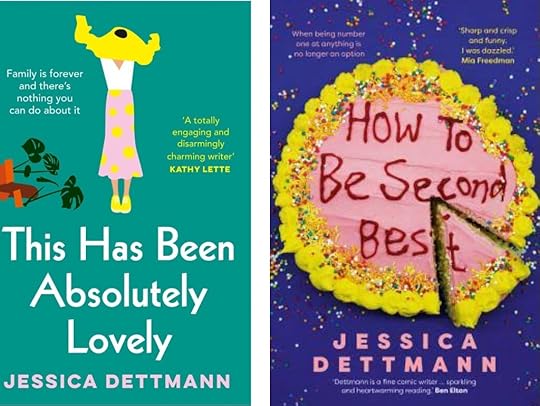 Image: two book covers, both by Jessica Dettmann, side by side. On the left is “This Has Been Absolutely Lovely”, which features an illustration of a blonde woman wearing a pink and yellow skirt, midway pulling a yellow top over her head, the background is teal. On the right is “How to be Second Best”, featuring a pink and yellow cake with a slice moved out of it, the book’s title written in the pink icing, the background is navy.
Image: two book covers, both by Jessica Dettmann, side by side. On the left is “This Has Been Absolutely Lovely”, which features an illustration of a blonde woman wearing a pink and yellow skirt, midway pulling a yellow top over her head, the background is teal. On the right is “How to be Second Best”, featuring a pink and yellow cake with a slice moved out of it, the book’s title written in the pink icing, the background is navy.In the last fortnight I’ve devoured two of Jessica Dettmann’s books, after seeing a post by my agent and friend Danielle Binks, singing Jessica’s praises.
The first book I read was “This Has Been Absolutely Lovely” – about the Jones family coming together after the death of the patriarch, and uncovering and unraveling some hidden truths about each family member. Fifty-something former semi-famous singer Annie Jones tries to get a break from mothering after all her children have left home, but the mothering never stops.
Then I moved onto “How to be Second Best“, which explored a different family dynamic – Emma juggles parenting her two kids; and also the child that was a result of her husband’s affair, while trying to be less of a pushover.
Both books share the theme of women losing their identity through motherhood, and wanting to find themselves again – and so much more.
It’s so good having a sticky beak into the intricacies of other families and relationships. And Jessica’s writing is so funny – so many LOL moments!
I’ve read the audiobooks and loved Michala Banas’ narration of both – so engaging. lit feels like getting engrossed in a really great show on Netflix, desperately wanting to get back to binge the show when I stop listening. The characters and dialogue are just so real and entertaining.
Jessica has a new book out this week – “Without Further Ado”, and I am teetering between wanting to read it now, and wanting to wait a while so there won’t be so long until I can read her fourth book!
Five stars for each. Jessica’s books are published through HarperCollins.

Find Jessica Dettmann’s books here.

May 9, 2023
Ichthyosis Awareness Month: Visibility is possibility
I wrote this in May 2020. It still stands. It’s still Ichthyosis Awareness Month too.
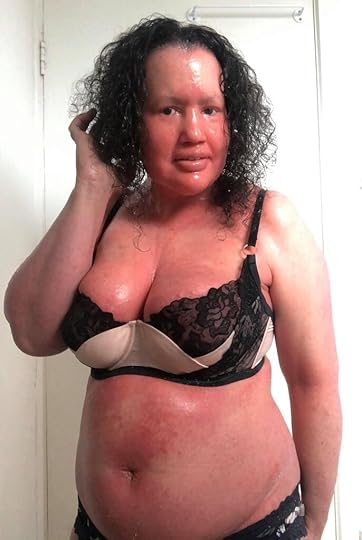 Image: woman with red face and body, shoulder length curly hair, wearing a bra and undies. She’s looking sultry, her hand is touching her hair.
Image: woman with red face and body, shoulder length curly hair, wearing a bra and undies. She’s looking sultry, her hand is touching her hair.I’m 38 years old and I’ve never seen a body that looks like mine advertising lingerie. I’ve never seen a body that’s red, splotchy and scaly, with skin flakes dotting their hair, wearing sexy (or even comfortable) underwear.
We are often told that type of skin we have is embarrassing, repulsive, something to be hidden away. We are told that bodies like mine aren’t supposed to be sexy.
No wonder a recent study has found that people with Ichthyosis are at high risk of experiencing mental illness.
And so I wanted to help change that, once again thanks to social media. I put on my best bra and undies (this doesn’t happen a lot – I am ALL about comfort!), set up the tripod in the bathroom and had some fun. I actually felt a little sexy.
And now these photos are here – for thousands of people to see.
This is my body.
No makeup, no filters, just a coating of the paraffin ointment I use twice a day.
And I love it.
There is no reason for a body like mine not to be included in advertising and media. We are sexy. In fact, the more bodies like mine that are visible, the less alone people with Ichthyosis will feel.
Visibility is possibility.
May is Ichthyosis Awareness Month. I used to take part in this -by way of sharing the stories of people with Ichthyosis and their families on my blog and social media. It was really fun, and a lot of work. But a few years back, I stopped. I stopped because, as much as we were making people aware, the ableism and discrimination still exists. The onus is always on us to educate – even within the Ichthyosis community.
Anyway, lots of amazing people are taking part in Ichthyosis Awareness Month through posting photos and words on Instagram. A few women to follow include @lyricallydiverse (who models swimwear!), @bumblebeemick, @tinasmith13,
@homerowfibreco, @lucybetts87, @mui_thomas92, @theflakefiles, @barbara.kedzior, @nelly984 and @cesilymarinosalazar.
You should also look up the #Ichthyosis hashtag and follow those people  I am so glad I can see lots of other people with Ichthyosis on social media too – this has definitely helped me find self acceptance and love, as well as community.
I am so glad I can see lots of other people with Ichthyosis on social media too – this has definitely helped me find self acceptance and love, as well as community.
Did this post help you learn more white ichthyosis? Please consider buying me a drink. Thank you!
May 8, 2023
Ichthyosis Awareness Month – on community and dignity
It’s Ichthyosis Awareness Month. I’ve written a little about how I really want to focus on community and dignity.
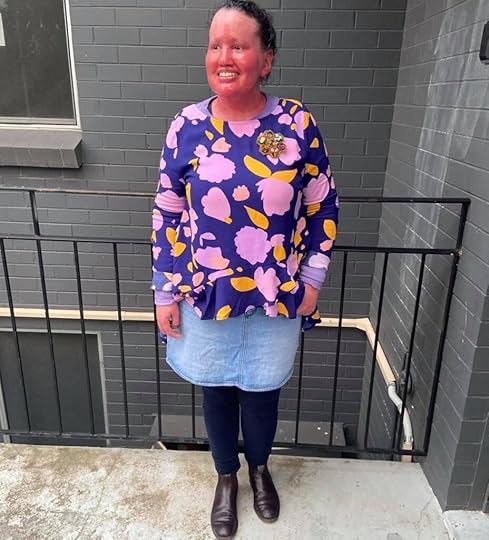 Image: a woman with a red face and dark curly hair tied back, smiling, wearing a navy, purple and mustard floral top that has a frilled hem over a short light blue denim skirt, dark boots and leggings. She’s also wearing an intricate brooch that’s a beehive. She’s standing on a balcony near a grey wall.
Image: a woman with a red face and dark curly hair tied back, smiling, wearing a navy, purple and mustard floral top that has a frilled hem over a short light blue denim skirt, dark boots and leggings. She’s also wearing an intricate brooch that’s a beehive. She’s standing on a balcony near a grey wall. 
Here are some ways to raise awareness while maintaining your dignity:
 Take up space – and don’t apologise for it. For me this has meant not fearing leaving my skin or ointment behind.
Take up space – and don’t apologise for it. For me this has meant not fearing leaving my skin or ointment behind.
 Demand access and inclusion in all aspects of your life – and access for others too. This could be be asking for room with a bath in a hotel, applying for a disability parking permit, asking for a chair at a concert, or asking a friend/organisation to hold an event indoors in hot weather – all to make the experience more comfortable. (I’ve done all of these things – and demanding doesn’t mean I don’t say please and thanks.)
Demand access and inclusion in all aspects of your life – and access for others too. This could be be asking for room with a bath in a hotel, applying for a disability parking permit, asking for a chair at a concert, or asking a friend/organisation to hold an event indoors in hot weather – all to make the experience more comfortable. (I’ve done all of these things – and demanding doesn’t mean I don’t say please and thanks.)
 Don’t diminish others’ experiences of Ichthyosis. We all have different symptoms, appearances, treatments and levels of self acceptance – and some people endure more discrimination than others. It’s all valid.
Don’t diminish others’ experiences of Ichthyosis. We all have different symptoms, appearances, treatments and levels of self acceptance – and some people endure more discrimination than others. It’s all valid.
 Campaign for rights and representation – for you and others. Write complaint letters about discrimination (when you have the energy); speak out about exploitative media representation of Ichthyosis; and don’t participate in harmful media.
Campaign for rights and representation – for you and others. Write complaint letters about discrimination (when you have the energy); speak out about exploitative media representation of Ichthyosis; and don’t participate in harmful media.
 Post unfiltered photos of you on social media. Let the world see your beauty; let the world see your difference.
Post unfiltered photos of you on social media. Let the world see your beauty; let the world see your difference.
 Say no to answering intrusive questions about your medical history. You don’t have to tell strangers how you “got like this”. Will it improve their day? Probably not.
Say no to answering intrusive questions about your medical history. You don’t have to tell strangers how you “got like this”. Will it improve their day? Probably not.
 Connect with others who have Ichthyosis. This is especially important for parents of kids with Ichthyosis to connect with adults with Ichthyosis.
Connect with others who have Ichthyosis. This is especially important for parents of kids with Ichthyosis to connect with adults with Ichthyosis.
 Don’t be afraid of showing joy. Life with Ichthyosis can be pretty difficult at times – with the itching and pain, a different appearance, and also the micro-aggressions and discrimination faced. But life is also pretty amazing. Seek joy, and show the world that you experience joy!
Don’t be afraid of showing joy. Life with Ichthyosis can be pretty difficult at times – with the itching and pain, a different appearance, and also the micro-aggressions and discrimination faced. But life is also pretty amazing. Seek joy, and show the world that you experience joy!

If this has helped you, please consider buying me a drink. Thank you!
May 3, 2023
It takes a village of allies to support a person with Ichthyosis – a new meme and some links to Ichthyosis resources
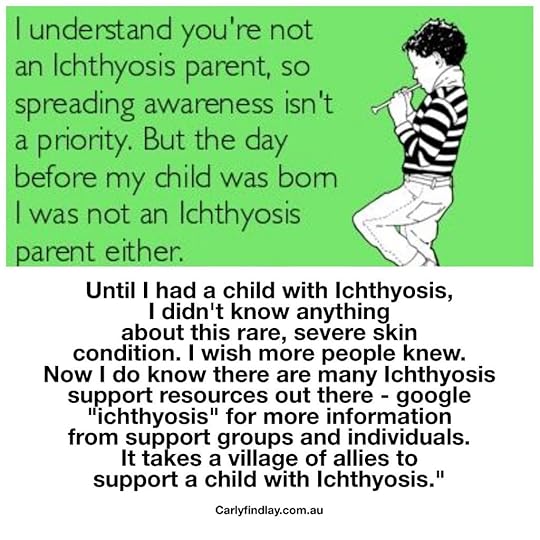
I have never understood this green meme that pops up every Ichthyosis Awareness Month. It seems aggressive and unhelpful.
Maybe it could be reworded to:
“Until I had a child with Ichthyosis,
I didn’t know anything about this rare, severe skin condition. I wish more people knew. Now I do know there are many Ichthyosis support resources out there – google “ichthyosis” for more information from support groups and individuals. It takes a village of allies to support a child with Ichthyosis.”
(Signed, an adult with ichthyosis.)
Resources
Some great organisations to seek out are:
Ichthyosis Support Group UK (LinkTree with more social media links)
Ichthyosis Association France (LinkTree with more social media links)
EURODIS – Rare Diseases Europe
South Asian Ichthyosis Network
Australian Ichthyosis Support Group
Centre for Related Members India.
Luke and the Tiger children’s book
I’ve also written lots about ichthyosis on this blog; as well as a book called Say Hello.
Feel free to share this meme below!
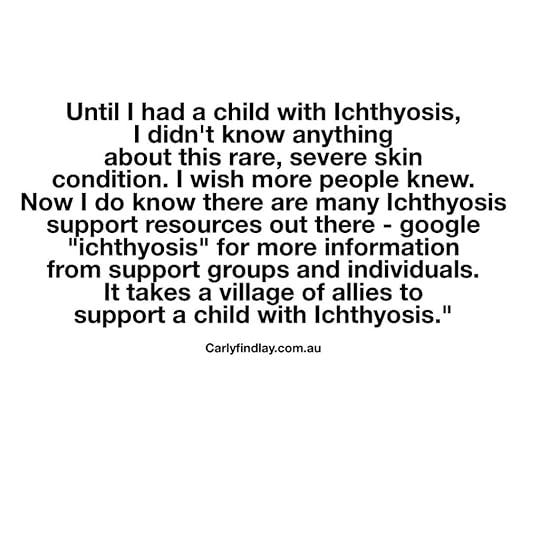
Images: 1. A collage of two memes, stacked on top of each other. The top is green with black writing. It reads: I understand you’re not an Ichthyosis parent, so spreading awareness isn’t a priority. But the day before my child was bom I was not an Ichthyosis parent either.
www.firstskinfoundation.org”. An illustration of a white child is next to the text.
The bottom is a rectangle white with black text, it reads: “Until I had a child with Ichthyosis,
I didn’t know anything
about this rare, severe skin condition. I wish more people knew. Now I do know there are many Ichthyosis support resources out there – google “ichthyosis” for more information from support groups and individuals. It takes a village of allies to support a child with Ichthyosis.” – CarlyFindlay.com.au is at the bottom. 2. A square cut of the second quote.
April 30, 2023
Doing activism my way
I wrote this for (the now defunct) Feminist Writers Festival blog, back in 2018, as I was writing my memoir, Say Hello. I was incredibly scared to publish this piece even, with words mulling in my head for months, after I lost a lot of friends in one go, one reason was that I wasn’t “doing” disability activism right, and there was some petty criticism about the title of my memoir. I worried this piece would result in more angst, fearing that angst would compound when Say Hello was released in January 2019. The piece didn’t create too many waves (that I know of). I had a great editor in Giselle Au-NhienNguyen, who helped me shape this from anxious word vomit to something stronger. I felt proud to have written bravely, thanks to the guidance of Giselle, and also my writing agents and Say Hello publishing team supporting me on the other project I had going.
Things have changed a little bit since I wrote this piece, and since I wrote Say Hello – the response to book has been amazing. People bought it, they read it, they talked about it, they studied it, and it helped so many. But it has been hard. Friendships have ended, friends whom I wrote about in the book. The huge expectations of me (compared to white disabled men, say), as well as lateral violence and online bullying in various forms, has increased significantly. But the love and the support has outshone the hate. It’s been pretty amazing. And if it’s helped one person feel less alone and come to find disability pride, I’ve done my job.
Would I have done a few things differently writing and promoting Say Hello? For sure. I think my biggest regret was not picking up the typos in my final proof read, and then spotting them as I narrated the audiobook, AFTER the paperback went to print! I also would have read more widely before I wrote it – seeking out works by disabled writers, especially disabled writers of colour. There’s some other changes I’d make, in hindsight.
Anyway, I never published this piece here. It’s an article about how scared and sad I was while writing my memoir. Maybe some of you who have written memoirs, or who have a public profile, can relate.
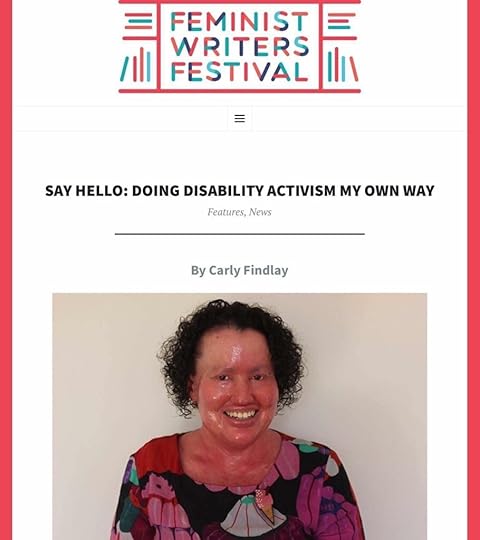 Image: woman with red face, short dark curly hair and bright dress, smiling. Above the photo is text in the form of a red and blue logo that reads “Feminist Writers Festival” and a heading and byline that reads “SAY HELLO: DOING DISABILITY ACTIVISM MY OWN WAY
Image: woman with red face, short dark curly hair and bright dress, smiling. Above the photo is text in the form of a red and blue logo that reads “Feminist Writers Festival” and a heading and byline that reads “SAY HELLO: DOING DISABILITY ACTIVISM MY OWN WAYFeatures, News
By Carly Findlay”.
Say Hello: Doing Disability Activism My Own Way
Around a year ago, I got a book deal to write a memoir. Due out early next year, Say Hello will tell my story of life with therare, severe skin condition ichthyosis. Writing this book has been the hardest thing I’ve ever done, but not just because of the length or the subject matter. It’s because in the process of writing this book, my disability activism has been questioned.
There has been silence from people I thought were friends. There have been suggestions about what I need to include in my book – well-meaning guidance, I suspect, but this book is about my own experiences. There have been whisperings that I am not doing activism ‘right’ through writing this book. I’ve been called too mainstream. The title evokes inspiration porn; it’s self-promotion and brand-building. There’s been criticism of me making money. There are complaints that there aren’t enough #ownvoices in disability literature, but since I’ve been given a book deal, there have been complaints about that.
I’ve realised that it’s frowned upon if disabled people have individual success – it must be collective.
There have been the usual challenges in writing this memoir: I worry about upsetting people I know with what I write about them. I’ve caught a glimpse of ugly sides of myself in the mirror, and delving into my history, I’ve found things I don’t like about myself, or that I could have done better. Putting words on a page helps me come to terms with those things, and strive to do better in the future.
But criticisms from within my own community have been the biggest causes of self-doubt, and seen my concerns groweven louder. I’ve called my publisher and agent, worried I can’t do this. I’ve woken my partner screaming from a nightmare that my book has set disability rights behind. A month out from the second draft due-date, I’ve been self-censoring because my greatest fear is letting the disability community down.
As well as being a part of various disability and illness communities, I’ve written for the mainstream for years, through the media and my blog – how can I change perceptions by writing solely in a closed space? The title is inviting people to communicate with me, rather than looking away. While my book is about me, I always try to amplify other voices that are less heard. Yes, I’m being paid to write it, but it works out to be a very modest wage over almost two years. Also, isn’t being paid what activists – including me – have fought for? Finally, I see my individual success having an impact on collective communities.
Many disability activists are burnt out because of the expectations around how they should do activism. Tone policing and purity politics are scare tactics which distractfrom actually getting the work done.
I admit to have been guilty of criticising others in the same way in the past, and regret telling activists how I think they should do their work. I recognise now that just as disability is diverse, so is the scope of what activism can look like.
When I voiced my sadness recently, a friend told me they received great advice from a university lecturer – to have one foot in the margins and one foot in the mainstream, in order to create change. This is how I want to do activism.
Say Hello will be the book I needed to read when I was younger. I didn’t have any role models with my conditionuntil I searched the internet in my teens. There were no memoirs on ichthyosis – only medical textbooks with people’s faces blacked out.
I didn’t identify as disabled until my mid-twenties, when I realised I experienced the same barriers as other disabled people. Perhaps if I had read about disabled people’s firsthand experiences when I was younger, I might have realised my own identity, and received a much-neededconfidence boost, much sooner.
My book is at once personal and political, from my own heart and experiences. As well as telling my story, it offersreaders advice on how to interact with someone who looks different. It includes disability politics and feminism, and messages to people with ichthyosis and their parents. It is not only for disabled readers – I hope people who are keen to learn more about disability politics and pride will get something out of it, too.
My memoir is for the young people with ichthyosis, for the parent who worried about the future of her child, for the woman a few years older than me who worried about wearing a summer dress until she saw my outfit photo.
It’s for the people like my long-ago self, who yearned to see their truths represented in someone else’s life story – to know that they aren’t alone.
I could either be stifled by fear and do nothing at all to create change, or do activism my own way, and create something I needed when I was younger. I want to see my book on the shelves next to many other disabled people’s. There’s room for all of us.
Has this post helped you? Will you use it in your work? Please consider buying me a drink – thanks!
April 29, 2023
Book review: The One and Only Dolly Jamieson by Lisa Ireland
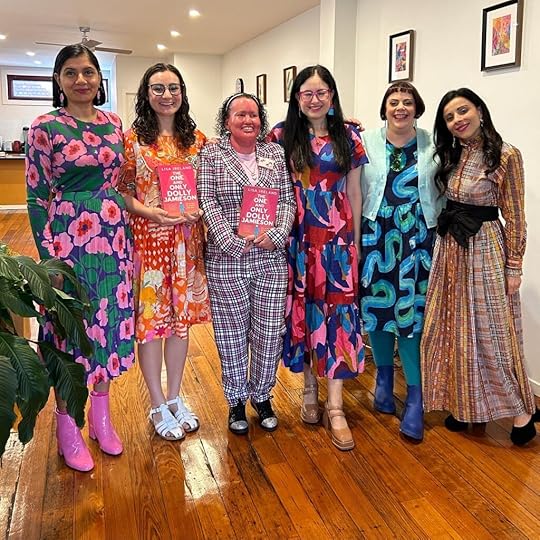 Image: Sifat, Candice, Carly, Lisa, Jules and Fran, wearing colourful clothes in a living room. Candice and Carly are holding copies of The One and Only Dolly Jamieson book.
Image: Sifat, Candice, Carly, Lisa, Jules and Fran, wearing colourful clothes in a living room. Candice and Carly are holding copies of The One and Only Dolly Jamieson book.My friends and I have a monthly book club, and this month I chose the book. I chose The One and Only Dolly Jamieson by Lisa Ireland, after hearing some of my writer friends and colleagues talking about it at brunch earlier this year.
Today my friends and I came together to discuss the book, and we all agreed it was beautiful.
I listened to the audio and the narration by Taylor Olwynns had me hooked. I was totally engrossed in Dolly Jamieson’s world. I didn’t want it to end.
Dolly Jamieson is an older woman who’s led a full life – a seemingly illustrious acting career, but also much heartbreak, loss and shame.
The story is set in London in 2019, where Dolly is homeless, or between abodes” as she prefers to say, after losing her home and wealth when her husband died a few years earlier. She meets Jane, a quiet and kind stranger, while in the library – a safe refuge for Dolly and many others who are lonely or alone. I loved how the library is celebrated in this book – libraries really do change lives.
The book also flashes back through Dolly’s life – in Geelong, Melbourne, Sydney, New York and London – detailing the start of her career, her loves, the losses she’s endured, and her hearty resilience and dignity throughout. There was a recurring theme of how peoples’ lives can change in an instant – for the worst, but also for the better.
Lisa Ireland has created such a wonderfully deep character in Dolly, and the supporting characters are intriguing, too.
It’s a book that explores women ageing, becoming homelessness and becoming invisible – because of caring roles, unstable work and a lack of knowledge about social supports . It also touches on shame – and shaking it off, and much more (that I don’t want to give away).
Above all, Dolly Jamieson is about friendship between women of different generations – Jane and Dolly’s friendship is delightful, and Dolly helps Jane shake her shame as much as Jane helps Dolly. And it’s about the power of being seen – Jane’s kindness in taking Dolly in helps Dolly become seen through a hot shower and clean clothes, as well as assisting Dolly to tell her life story.
I also loved Lisa Ireland’s end chapter in her own words (and voice) about the inspiration behind the book, and some statistics about the increasing prevalence of women’s homelessness.
Five dazzling stars.




Buy The One and Only Dolly Jamieson in paperback, ebook and audiobook.
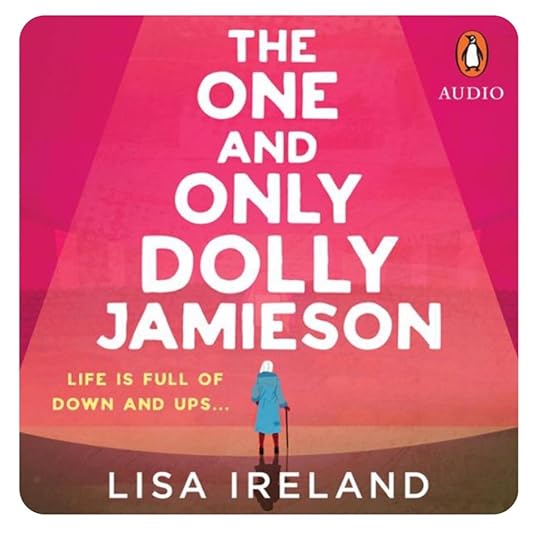 Image: The book’s cover. It’s mostly red with an older woman wearing blue, carrying a walking stick, looking toward the sunset. The title is in big white text and reads “The one and only Dolly Jamieson” by Lisa Ireland. Yellow text next to the woman reads “life is full of down and ups”.
Image: The book’s cover. It’s mostly red with an older woman wearing blue, carrying a walking stick, looking toward the sunset. The title is in big white text and reads “The one and only Dolly Jamieson” by Lisa Ireland. Yellow text next to the woman reads “life is full of down and ups”.
April 27, 2023
My chat on Lissie Turner Presents Podcast
It’s been a while since I was a podcast guest. I was invited on Lissie Turner Presents recently, and it was such a great experience.
You might know Lissie as Mel Bampton from Triple J. Lissie was such a curious, warm and safe podcast host – she enabled me to talk about some deep stuff.
Video: a still photo of Carly, next to a yellow rectangle, with text saying “LISSIE TURNER PRESENTS…” “Carly Findlay” is across the yellow section and the photo. There is also pink lines representing audio playing, and captions.
I talked about my conflicting feelings about being considered as an influencer, meeting Adam, being very good at making people feel comfortable, and my fandom. I also touched on assisted suicide, so do take care when listening.
I had so much fun talking with Lissie, and I’m grateful for the opportunity.
You can listen to me on Lissie Turner Presents on ITunes and Spotify, and anywhere else you get your podcasts.
Check out all of Lissie Turner’s podcasts on her website.
April 16, 2023
Book launch for You’ll Be A Wonderful Parent by Jasper Peach
Today I went to the launch of Jasper Peach’s book, You’ll Be A Wonderful Parent – Advice and encouragement for rainbow families of all kinds. It was brilliant.
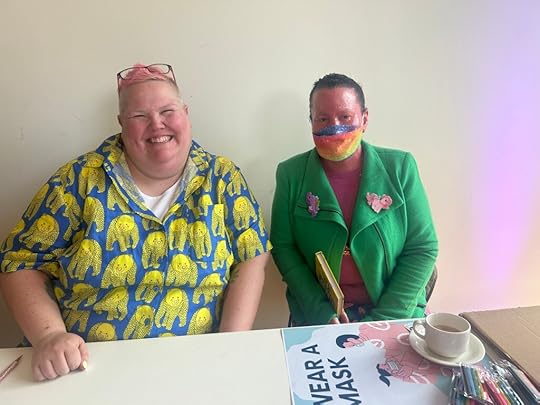 Image: Jasper and Carly sitting, smiling, both wearing bright clothes. Jasper is a white non binary person with short pink hair, wearing a blue top with yellow bears on it. Carly is a woman with a red face and short dark curly hair tied back, wearing a green jacket and pink top, and rainbow mask. “Wear a mask” poster is on the table in front of Carly.
Image: Jasper and Carly sitting, smiling, both wearing bright clothes. Jasper is a white non binary person with short pink hair, wearing a blue top with yellow bears on it. Carly is a woman with a red face and short dark curly hair tied back, wearing a green jacket and pink top, and rainbow mask. “Wear a mask” poster is on the table in front of Carly. 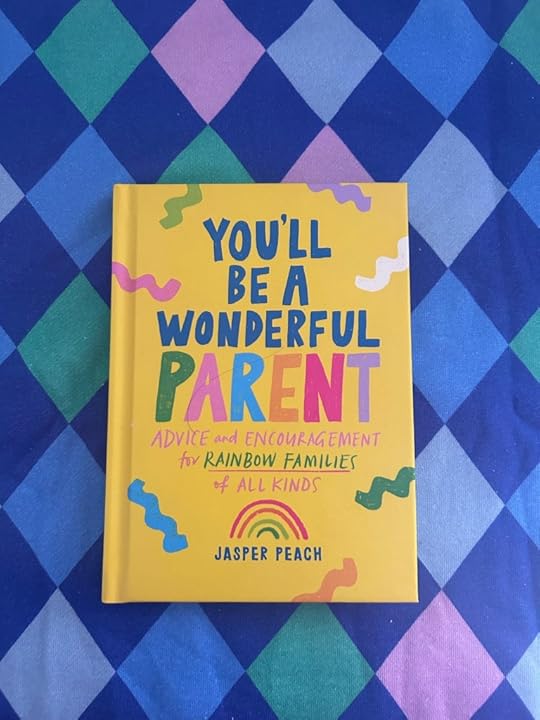 Image: a book called “You’ll be a wonderful parent – advice and encouragement for rainbow families of all kinds” – by Jasper Peach. It’s yellow with a rainbow and colourful squiggles. It’s on blue, green and pink diamond print fabric.
Image: a book called “You’ll be a wonderful parent – advice and encouragement for rainbow families of all kinds” – by Jasper Peach. It’s yellow with a rainbow and colourful squiggles. It’s on blue, green and pink diamond print fabric. Jasper is a non binary, trans and disabled parent, and has created this book so other rainbow parents feel less alone. What a generous gift.
The book launch was like a big warm hug – for Jasper, and their illustrator Quince Frances; and also for everyone who attended. Children played happily; everyone was encouraged to do what they needed to feel comfortable – like move the the sensory room, colour in, get food and drinks, walk around; and Jasper and host Roz Bellamy reminded non binary, trans and gender diverse people of how much they are loved and valued. And there was cake!
There were speeches by Jasper, a Q&A -hosted by Roz – between Jasper and Quince about the illustration process, Ailsa Wild – an ally who helped make this book happen, and Jasper’s two kids.
It was accessible in many ways – held at North Fitzroy library which is a beautiful, bright and airy space; great ventilation; RATs and masks, colouring books, a sensory room; cushions; a play space for children; food and drink; and visual and audio recording to upload at a later date. Everything was beautifully considered to create access and inclusion. The children were so happy and comfortable and looked after by their peers and the grown ups. Community 
Both Jasper and Ailsa read out this paragraph from the end of #YBAWP, and I wanted to share too:
“And the single greatest gift you can give yourself, next time you look in the mirror, is to regard that person staring back with that same joy and pride and acknowledge that, despite the scars of this world, you are loved. You are worthy. You are here and perfect – as a parent and as a person – just as you are.”
If you’re a parent (or wanting to become a parent) in the LGBITQA+ community, or know someone who is; if you’re a nurse, midwife, obstetrician, social worker or GP; if you are an ally to LGBTIQA+ people – please buy this book, or borrow it from your library. It’s so valuable. And it’s a great companion to Eliza Hull’s We’ve Got This, which Jasper also features in.
You’ll Be A Wonderful Parent is published by Hardie Grant and is available at bookshops and libraries. Follow Jasper on Twitter and Instagram.
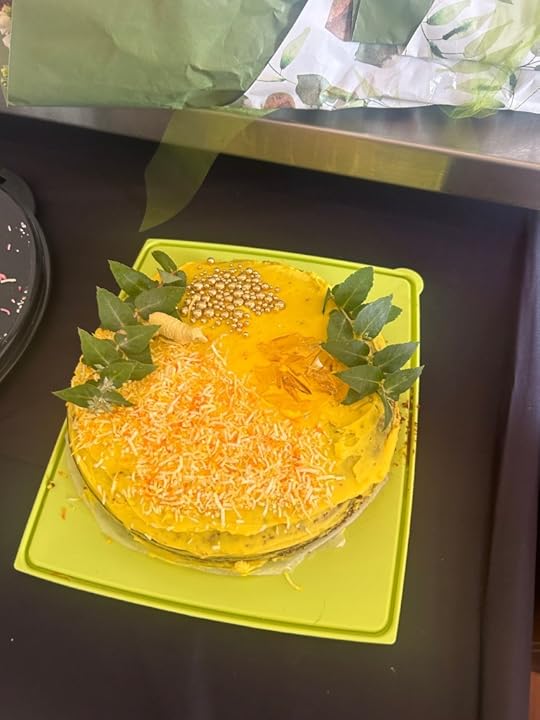 image: A yellow cake with gold balls and green leaves on it.
image: A yellow cake with gold balls and green leaves on it.
April 9, 2023
Being Seen on Screen talk at ACMI (and meeting Geena Davis!!)
I get to do some cool things and meet amazing people in my work!
On Wednesday I was lucky to speak at the Being Seen on Screen conference hosted by ACMI. The panel I spoke on was called Bodies On Screen – and I facilitated a conversation between me, Taryn Brumfitt (2023 Australian of the Year, filmmaker of the Embrace and Embrace Kids documentaries, founder of The Body Image Movement); Milo Harthill (body positivity activist, actor, model, influencer) and Amy Marks (filmmaker, disability activist, winner of the Stella Young Award at Arts Access Victoria). What a team.
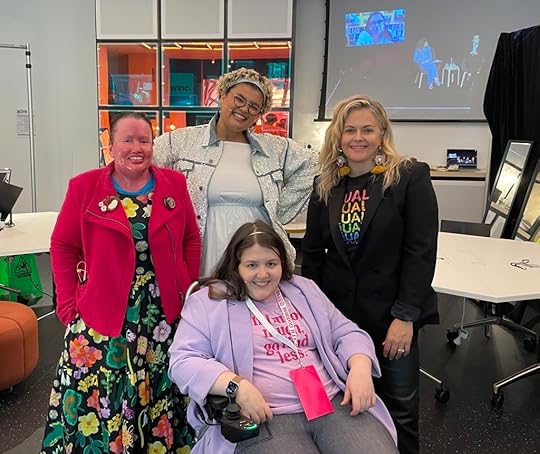
image: Carly, Milo, Taryn and Amy, in the green room before the panel.
Amy had the great idea for each of us to give a five minute speech, then invite audience questions. It meant that we all got to have a lengthy say, and then have a robust, often funny discussion.
We talked about the need for different bodies to be seen on screen, as well as the need for better access to the screen industry overall. Amy and I were the only (visibly, openly) disabled people on the agenda all day, and so our conversation was very disability focused.
Here’s my speech:
I’m a writer, speaker, appearance activist and arts worker. I am a woman of colour, am disabled, and I have a facial difference. I’ve done a little TV – You Can’t Ask That, The Project and The Cook Up have been some favourites, and I have certainly written a lot about representation on screen. The first time I saw someone with ichthyosis on screen was on a show called Medical Incredible, when I was about 17. I’ve also seen Ichthyosis featured in Embarrassing Bodies and in other articles with disrespecting headlines. I sought to change that through working in the media.
I often say, Disability is often the forgotten aspect of diversity. Its rare disability is remembered or accommodated.
The way disabled people are shown on screen – often as the villain or having a tragic life – shapes how people see us. I strongly believe this is why children have been scared of me. And so we need disabled people – not just on screen but in writers rooms, overseeing auditions, behind the camera and on awards panels.
I am an ambassador for Face Equality International – an alliance of NGOs, charities and support groups which are working at national, regional or international levels to promote the campaign for ‘face equality’.
Face Equality International has recently released a position paper, calling for better representation on screen.
“In the wake of the 2023 awards season which was almost entirely devoid of positive, accurate, authentic representation of people with disfigurements and visible differences, we’re calling upon the entertainment industry to prevent further marginalization of the visible and facial difference community.
Right now, there are several new productions in the making or awaiting release that we know will rest upon outdated, harmful tropes around disfigurement. From Star Trek: Strange New Worlds to The Hunchback of Notre Dame. If the industry hears our call now, we can prevent future generations of children from being indoctrinated by stories that tell them to fear or look down upon people with visible differences.”
Last year I wrote a feature on Australian actor Kiruna Stamell, for The Saturday Paper. I want to share some of this article with you. I also want to mention that this section contains a disability slur that Kiruna referenced in her interview, Kiruna made her acting start in Moulin Rouge in 1998, is a regular presenter on PlaySchool, and recently featured on The Serpent Queen on Stan. Kiruna is disabled, and in short, has moved to the UK to work as an actor because she encountered barriers within the Australian screen industry.
While at school, a careers advisor gave her valuable advice. “She advised me to make my own work, to tell my own stories, encouraging me to film little projects and audition tapes and send them to progressive directors overseas by email. And that was exactly what I ended up ended up doing.”, Kiruna told me.
Kiruna Stamell auditioned for a leading Australian drama school but was was told “there was no point training dwarf ”. “What could I have learnt from them,” she asks, “if they didn’t see me as castable?” While Stamell says it was limiting, this rejection pointed her in better directions.
Kiruna is now starring in Doctors, a soap on the BBC. She’s playing a mother and is thrilled her character has a backstory that’s beyond disability. She thought that turning 40 would limit her – because of ageism as well as ableism – but has discovered that it has been affirming. She says the new role is brilliant as she is working business hours and has weekends off.
Disabled people are often asked to do additional work when on screen – disabled people are the often the ones doing the work in making things accessible and inclusive. It can be exhausting and unpaid. Casting directors often contact me to ask if I can spread the word about their project, and they have done no community or trust building to connect with disabled people. And often, we are only given a few minutes on current affairs programs, usually only to talk about disability. But imagine the things we could cover if we were given a regular cohosting opportunity.
But if we are anything less than grateful to be given an opportunity, even if we ask for our access needs to be met, we are seen as difficult.
Disabled people are very good allies to other marginalised groups. But I’m not seeing the same level of Allyship extended to us by those same groups.
I’m not seeing a commitment to access. I’m not seeing accessible social media and an attempt to stop using ableist words. I’m not seeing a commitment to boycotting a film or theatre production if there’s an ableist trope – for example a character with a facial difference who is a villain in it – like we see with casting of a cisgendered actor playing a transgender character; or if there’s cultural appropriation like “black face”.
I’m still seeing ableist language and tropes on screen.
I’m still seeing non disabled people playing disabled characters, particularly in the before their were disabled scenes. The excuse is, they can’t get a disabled person to play a non disabled person. Look, I don’t know too much about animation – but if they can CGI a bear that speaks, dances and wears clothes, they can CGI a disabled person for the whole film.
I have hope. There are some great stories of inclusion and representation on screen:
Nas Campanella and Elizabeth Wright are ABC’s disability affairs reporters, Beth Bradfield who stars in Malory Towers, Chloe Hayden on Heartbreak High, Hannah Diviney who was the first Australian disabled actor to play a character who has sex on screen in Late Comers on SBS (which was written by Emma Myers and Angus Thompson, two disabled creatives) , Fiona Tuomy who the CEO of The Other Film Festival and is on the Gender Matters taskforce, Meret Hassenan who is a producer on ABC programs, we regularly see Jamila Rizvi, Grace Tame and Elly Desmarchelier on news programs, and Amy Marks, a young filmmaker who is sitting on stage now. And I was recently on four episodes of The Cook Up – doing what I love, cooking.
There are many passionate people in this room today. I implore you to ensure you to make space for and genuinely include and represent disabled people. We have a right to be seen on screen.
I want to end with the catchphrase of today’s event – “If you can see it, you can be it.”
After I did The Project in 2019, my friend Casey sent me a photo of Chaz, her little boy with ichthyosis. He was four at the time, and in the photo, he was watching TV, pointing at the screen.
Chaz said, “This is my friend Carly, she has the same skin as me.
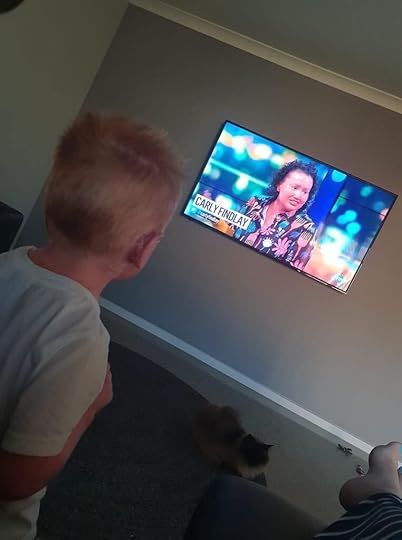
Image: a small child watching me on tv, his back is to the camera.
/end of speech
Here we are on stage.
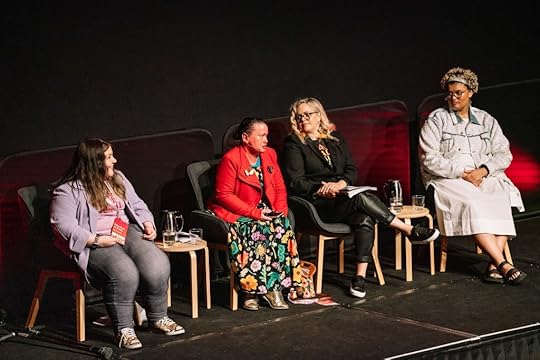
Image: Amy, Carly, Taryn and Milo, sitting on stage, in conversation
InsideFilm Magazine has detailed the conference’s aim and theme – read about it in this article.
There were so many incredible speakers at the conference – Jan Fran, Elaine Crombie, Emma Fulu, Anusha Duray, Sigrid Thornton, Madeline Di Nonno and many more.
Geena Davis was the keynote speaker. The Geena Davis, star of Thelma and Louise, Stuart Little, A League of Their Own, Beetle Juice, The Long Kiss Goodnight, Grey’s Anatomy and Glow, to name just a few movies and TV shows. She was brilliant – talking about her acting career and also how she has become good at sports (she’s excelled at archery). She also said she only ever chooses acting roles where the characters are role models. She also covered the reason she started the Geena Davis Institute – because when her daughter was a toddler and they started watching TV and movies together, Geena noticed that there was not a good representation of women on screen. The catchphrase of the Institute is “If She Can See It, She Can Be It”. I really enjoyed hearing Geena mention how disabled people make up around 26 percent of the US population, and yet we don’t see that reflected on screen, it’s averaging one percent. You can read more about her appearance in this Screen Hub article.
Now I am going to fangirl for a moment.
After Geena spoke, I was lucky to meet her very briefly. She told me she was given my memoir by the organisers, which made me so excited. And that would be the reason why she waved to me and smiled at me when she waited to go on stage – and my colleagues and friends were silently squealing. Of course, she recognised me from the book’s cover!
Years ago, when I was trolled on Reddit, a nice Redditor came to my defence & said Geena & I have a similar smile. It’s a bit wanky to say, but I think we do too. And Geena agreed, but maybe she was just being polite, haha!
Hearing Geena’s commitment to making real change on screen was great, meeting her was wonderous. I was beaming.
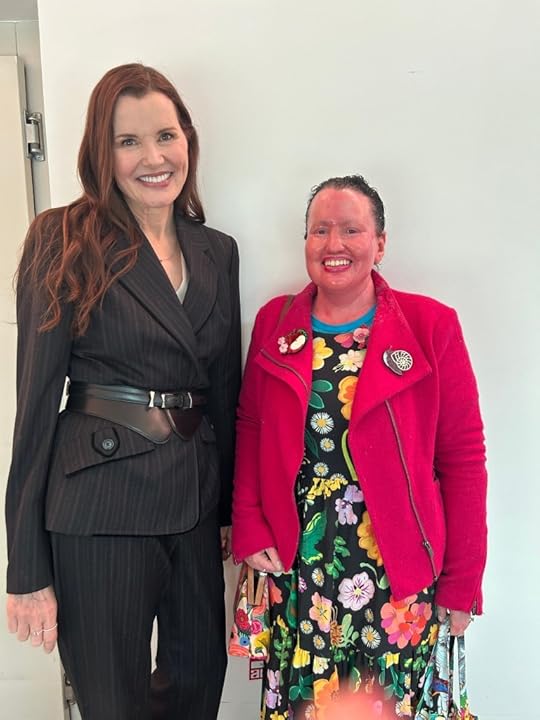
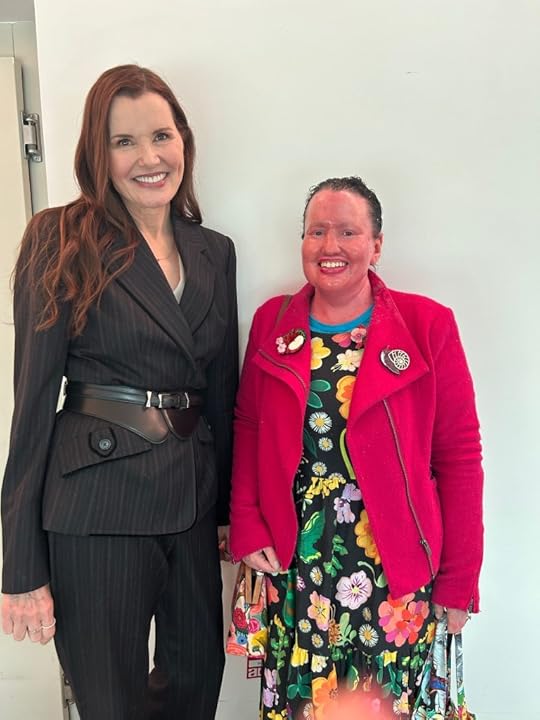
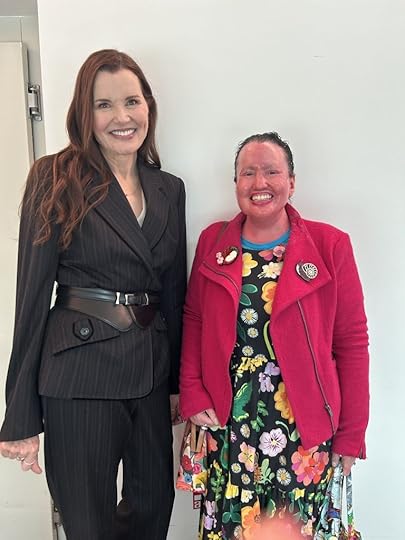
images: Geena Davis standing next to Carly Findlay, both smiling widely. Geena is wearing a black suit, belted, and Carly is wearing a floral dress under a red coat. Carly is beaming in them all.
I also got to spend some quality time with Taryn Brumfitt, who I’ve known for years. I’m thrilled she was named 2023 Australian of the Year for her body image work. Loved talking to her about her work.
Here we are with our books (either side of Geena’s!).
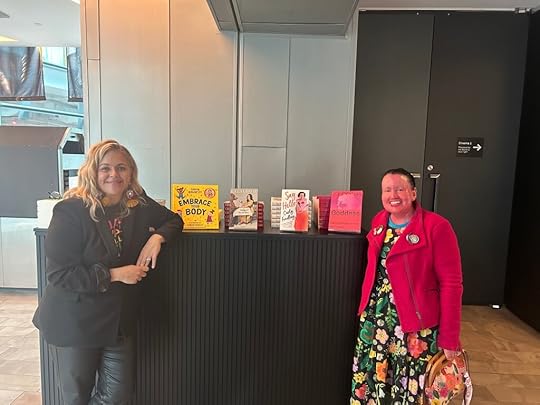
Image: Taryn and Carly, standing near a counter, either side of their books, with Geena Davis’ book in the centre.
And here we are in front of the CountDown sign.
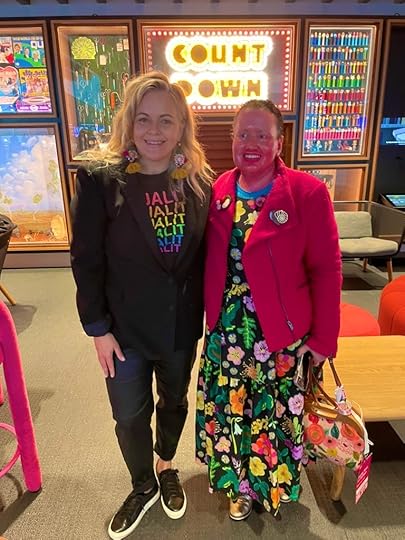
Image: Taryn Brumfitt and Carly Findlay in ACMI. Taryn is wearing black and Carly is wearing a red jacket over a floral dress.They’re standing in front of a neon CountDown sign.
What a truly incredible day. Thanks for having me ACMI. I feel very lucky to have these opportunities.
The Geena Davis Institute on Gender in Media is partnering with ACMI in the Goddess exhibition – featuring women on screen through the decades. It’s on until 1 October in Melbourne. I haven’t seen it yet – I can’t wait to go!
March 17, 2023
How to talk to kids about people with facial differences and disabilities
Today I had a wonderful experience in the post office, very soon after I gave a talk where I received the question “what can parents do to help educate their kids about people who look different?”
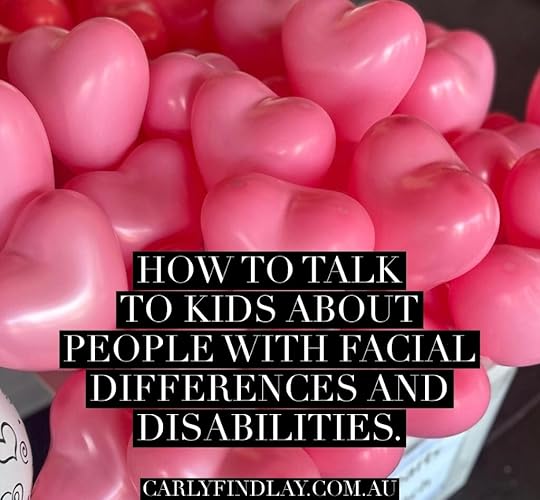
Here’s what happened while I was addressing a parcel.
A young child near to me asked his mum what’s wrong with my face?
“I was born this way”, I said, smiling through my mask.
“Yes she was born that way”, the mum repeated, adding, “everyone’s different”.
I thanked her.
“Do you mind if I ask, is that Harlequin Ichthyosis?”, she asked.
Oh my gosh! She prefaced the question about Ichthyosis with a question about consent. And it was perfect pronunciation of Ichthyosis too! This rarely happens!
“You know how to pronounce Ichthyosis!” I said, excitedly. “Yes it’s Ichthyosis, but a different type, mine is Netherton’s Syndrome” I added. I thanked her again for being so proactive and respectful.
“I have to find an age appropriate way to explain to my son. We can all do our bit to educate. It’s the least I can do.”
This is allyship. It gently educated, asked for permission to ask a further question, recognising the onus isn’t always on us to educate. And it was a relief that the conversation was calm and polite. My heart was full. 
Image: lots of pink heart shaped balloons, with text overlay. White text on black background reads: How to talk to kids about people with facial differences and disabilities.” CarlyFindlay.com.au is below.
Has this post helped you? Will you use it in your work or at school? Please consider buying me a drink.



